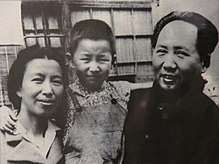Li Na (daughter of Mao Zedong)
Li Na (simplified Chinese: 李讷; traditional Chinese: 李訥; pinyin: Lĭ Nà or Li Ne,[1] born August 1940), is the daughter of Mao Zedong and his fourth wife Jiang Qing, and their only child together. Her surname is Li rather than Mao, because her father used the pseudonym "Li Desheng" (李德胜; 李德勝) for a period of time during the Chinese Civil War.
Li Na | |
|---|---|
 Li Na as a young girl, with her parents Jiang Qing and Mao Zedong | |
| Born | August 1940 (age 79) |
| Alma mater | Peking University |
| Spouse(s) | Xiao Xu (divorced) Wang Jinqing |
| Children | 2 |
| Parent(s) | Mao Zedong Jiang Qing |

The names of Li Na and her sister Li Min come from Book 4 of the Analects of Confucius: "ne yu yan er min yu xing" (讷于言而敏于行, meaning slow in speech and earnest in conduct).[2][3]
Biography
Li Na was born in Yan'an in August 1940. In her childhood, she was fascinated by Russian as well as Classical Chinese literature. In 1949, Li moved to Beijing with her parents, and started third grade at Yuying Primary School. Four years later, in 1953, she was admitted to the Beijing Normal University Girls' High School.
Excelling in her studies, she majored in History at Peking University, graduating in 1966. Post-graduation, she was assigned to People's Liberation Army Daily as a writer, under the nom de plume Xiao Li. Subsequently, at the age of 27, she became its chief editor.
In 1970, she was sent to work at the May 7th School in Jinxian County, Jiangxi, and during her time there, fell in love with Xiao Xu. Xiao was the waiter at the Beidaihe Guesthouse. To the consternation to her mother, but the approval of Mao, Li married Xiao and gave birth to a son, Xu Xiaoning. Mao even gave them a set of Selected Works of Marxism. However, a rift subsequently developed in their marriage, and it ended in divorce.
She was a member of the 10th National Congress of the Communist Party of China in 1973, and the Party Chief of CPC Pinggu County Committee and Deputy Secretary of CPC Beijing Committee from 1975 to 1994.[4]
Since 2003, Li Na has been a member of the Chinese People's Political Consultative Conference.[5]
Notes
- Li Na pronounced her own name as "Li Na" (see, e.g., a television interview by Yangguang Weishi (阳光卫视)). The traditional pronunciation of the character "讷" was "Nà"; however, in Modern Standard Chinese it has shifted to "Nè": see "讷" in 辞海 [Cihai]. Shanghai Literary Press. 1999. ISBN 7-5326-0702-X.. See also contemporary dictionaries which only list the "Nè" pronunciation, e.g.: Xinhua Zidian p.357, Commercial Press 1998, ISBN 7-100-02601-6; the 现代汉语词典 [Modern Chinese Dictionary] (5th ed.). The Commercial Press. 2005. p. 986. ISBN 7-100-04385-9.; or the 古今汉语词典 [Ancient and Modern Chinese Dictionary]. The Commercial Press. 2000. p. 1024. ISBN 7-100-02822-1.; or the 新华汉语词典 [Xinhua Chinese Dictionary]. The Commercial Press. 2004. p. 887. ISBN 7-80103-362-0.. Some reliable sources also call her Li Ne (see, e.g., New mood of open-minded politics gaining ground in China Archived 2011-07-19 at the Wayback Machine, Xinhua News Agency, March 4, 2003). However, some other reliable sources call her Li Na.
- “红色公主”李讷 ['The "red Princess", Li Na']. Sohu.com (in Chinese).]
- Zhao Zhichao (赵志超) (2000). 毛泽东一家人 [The Family of Mao Zedong] (in Chinese). Zhongyang Wenxian Press (中央文献出版社). ISBN 978-7-5073-0770-2.
- 李讷不平静的生活 [The Unpeaceful Life of Li Na] (in Chinese).].
- 政协委员出"名门""毛氏三姐妹"聚首政协会 (in Chinese). People's Daily. 2003-03-03. Retrieved 2011-02-03.
External links
